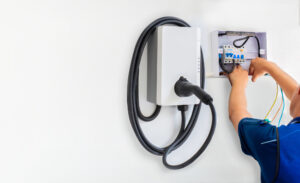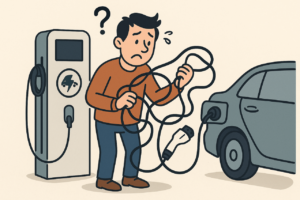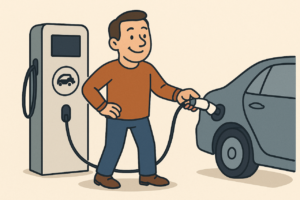EV Charger Installers in Brighton

Installing an electric vehicle charging point is a smart investment for both homeowners and businesses. Bishops of Brighton offers friendly, professional EV charger installation services across Brighton, Hove, and Sussex.
We make it easy to charge your EV safely at home or on commercial premises – from helping you choose the right charger to full installation and certification.
Call us on 01273041126 for a free quote!
Below we explain the types of chargers available, what to expect from the installation process, and the key questions we’ll discuss to ensure everything runs smoothly.
Understanding EV Charger Types (Slow, Fast & Rapid)


Not all EV chargers are the same – they mainly differ by how quickly they charge (slow, fast, or rapid) and their configuration (tethered vs untethered, single-phase vs three-phase).
Here’s a quick rundown of the common types of EV chargers in the UK:
- Slow Chargers (up to ~3 kW): These are the slowest charging option, often using a standard 3-pin mains plug or a dedicated 3.6 kW unit . A slow charger typically adds around 5-10 miles of range per hour. It’s suitable if you have ample time (charging can take 12+ hours for a full charge) – for example, plugging in overnight or for hybrid vehicles with smaller batteries. Slow charging is usually seen at home in a pinch (hence the nickname “granny charger” for the 3-pin cable), and it’s not a long-term solution for most EV owners due to the lengthy charging times .
- Fast Chargers (7 kW to 22 kW): “Fast” chargers are the most common for home and workplace installations. A 7 kW charger (single-phase) is the typical home wallbox in the UK, capable of charging most EVs from empty to full in 6-10 hours overnight . This adds roughly 25-30 miles of range per hour of charge. Fast chargers also include 22 kW units, which charge three times faster but require a three-phase electrical supply – something most businesses have but standard homes usually do not . (Most UK residential supplies are single-phase and support up to 7 kW only, unless you pay for a costly 3-phase upgrade.) Fast chargers are ideal for daily charging at home, as well as offices, supermarkets, or car parks where vehicles might stay for a few hours. Popular brands in this category include Pod Point, Myenergi (Zappi), Wallbox, Rolec, Hypervolt, EO, and even Tesla’s Wall Connector for Tesla drivers – all of which we can supply and install. For example, 7 kW home chargers use the standard Type 2 connector and offer convenience and safety compared to trailing a cable from a socket .
- Rapid Chargers (50 kW and above): “Rapid” chargers are high-power units usually found in public charging stations (motorway services, petrol stations, etc.) rather than in homes . These use DC charging to deliver 50 kW or more, enabling very quick top-ups – often charging an EV battery from 0 to 80% in as little as 30-60 minutes . Newer ultra-rapid chargers provide 100 kW, 150 kW or even 350 kW on compatible vehicles , giving an 80% charge in 20 minutes or so . Rapid chargers always have a tethered cable with a special connector (such as CCS or CHAdeMO) and are intended for en-route fast charging. It’s not feasible to install 50 kW rapid chargers at a typical home due to the enormous power requirements – instead, home and workplace solutions focus on slow/fast AC chargers as above. If your business requires high-speed charging (for example, a fleet depot), we can advise on appropriate solutions, but most local companies find that multiple fast 7 kW or 22 kW units serve well for regular use.
Tethered vs Untethered Chargers: When installing a home or commercial charging station, you’ll also choose between tethered and untethered units. A tethered charger has a permanently attached charging cable (like a petrol pump hose for your car), whereas an untethered (socket-only) charger has no fixed cable – you plug in your own separate cable each time . The choice comes down to convenience versus flexibility. Tethered models are very convenient – you simply grab the attached cable and plug into your car, no need to fetch your own cable each time. They’re great if you want plug-and-go ease, and they eliminate worry about cable theft (since the cable is integrated and secured) . We typically supply tethered units with a Type 2 connector, which fits all modern European EVs . Untethered chargers, on the other hand, give a neater look (just a clean socket on the wall) and allow different cable types if needed – useful if you have multiple EVs or might change to a model with a different connector in the future . Untethered units tend to be a bit cheaper too (you’re not paying for a fixed cable) . The downside is you must have your own Type 2 cable handy and plug it in every time – a small extra step. Our team can walk you through this choice. In practice, most customers with a dedicated daily driver prefer tethered for the convenience, but if you value a tidy appearance or plan to take your cable on the go, an untethered charger is a great option . Either way, all our installations use certified, weatherproof equipment made for UK conditions.
Our EV Charger Installation Process
We handle the entire installation from start to finish with minimal fuss. Whether it’s a straightforward home charger on your driveway or a more complex setup for a commercial car park, our qualified electricians ensure everything is done safely, to code, and tailored to your needs. Here’s what to expect when you book an EV charger installation with Bishops of Brighton:
- Initial Survey & Free Quote: We begin with a site survey, either in person or often via an online assessment. We’ll discuss your requirements and examine your electrical setup (we may ask for photos of your fuse board and meter, for example). This survey helps us determine the best location for the charger and if any preparatory work is needed . Key factors include where you park your car, distance to the mains supply, and the condition/capacity of your electrical system . For home installations, it’s important you have off-street parking (driveway or garage) so we can mount the charger within your property boundary. Once the survey is done, we’ll provide a clear, no-obligation quote. We supply a range of quality chargers to suit your situation – from simple 7 kW home units to robust 22 kW three-phase systems for businesses – and we’re happy to advise on the choice of charger brand and model that best fits your EV use case.
- Electrical Load Check & Preparation: Safety is our top priority. Before installation, our electricians will verify that your existing electrical panel (consumer unit) can support the additional load of the EV charger. This includes checking your main fuse rating, meter tails, and earthing arrangements . In many cases, a 7 kW charger is easily accommodated, but if you have an older fuse board or limited capacity, we’ll outline any upgrades (such as fitting a new circuit breaker, or an earth rod/protector if required by regulations). We also handle the necessary paperwork to notify the Distribution Network Operator (DNO) about the new charger circuit . (By law in the UK, the DNO must be informed when a high-power device like an EV charger is installed, and in some cases approval is needed in advance.) Don’t worry – we take care of this process for you and ensure all requirements are met. If you’re a business installing multiple chargers or higher-power units, we’ll also perform a more detailed load assessment. In some commercial cases we might recommend load balancing solutions or scheduling to avoid exceeding your supply capacity. Once the prep work and permissions are in place, we schedule an installation date that suits you.
- Professional Installation: On the day of installation, our team will arrive on time and walk you through the plan before work begins. We will mount the charger in the agreed location (on an exterior wall or garage wall, or on a sturdy post if needed). Then we’ll run the cabling from your main consumer unit to the charger. We do our best to minimise any disruption – typically we can neatly clip the cable along walls or bury it underground if crossing flowerbeds or paths (we’ll have discussed cable routing with you during the survey). Most standard installations include up to ~10 metres of cable run and one wall penetration if required . We will install an appropriate isolator switch and a dedicated Type C MCB or RCBO in your fuse board for the charger circuit , ensuring the circuit is protected by an RCD as per the latest 18th Edition wiring regulations (BS 7671). If your charger has extra features like a CT clamp for solar or load management, we’ll set that up too . Our electricians work efficiently and to a high standard – a typical home charger install usually takes only a few hours . For commercial installs with multiple units, the job may take a day or more, but we can often install chargers in stages to keep your business running with minimal interruption.
- Testing, Certification & Handover: After fitting the charger, we perform full electrical testing to be certain everything is working safely and as intended . We then certify the installation – you will receive an electrical installation certificate (and Part P building regulation notification for domestic installations) for your records, giving you peace of mind that the work meets all legal standards. Our team will also help you set up the charger’s smart functions if applicable. For example, we’ll connect it to your Wi-Fi (or verify the built-in 4G connection) and assist you in pairing the charger with its smartphone app or control interface. We make sure you know how to use features like scheduling (handy for off-peak energy tariffs) and we won’t leave until you’re comfortable and charging! Finally, we’ll tidy up the work area – you’ll be left with a ready-to-use EV charging point and no mess. Of course, our service doesn’t end there: Bishops of Brighton is a local company that stands by its work, so if you have any questions later on or need aftercare, we’re just a phone call away. All our chargers come with manufacturer warranties (typically 3-year or 5-year) and we guarantee our installation workmanship.
Residential & Commercial: We provide EV charging solutions for both homes and commercial properties. For homeowners, we mainly install single 7 kW smart chargers, which are perfect for overnight charging and daily use. For businesses or landlords, we can install multiple chargers and even assist with the UK Workplace Charging Scheme grants if eligible. Commercial installations might include wall-mounted units in a car park or robust posts for public-facing charging bays. No matter the setting, our approach is the same – careful planning, quality hardware, and certified work. We tailor the installation to your specific needs, whether that’s a discreet charger by your driveway or a network of chargers to support your employees and customers.
Key Questions To Consider Before Installation
To ensure the installation goes smoothly and the charger fits your needs, our electricians will discuss a few practical points with you beforehand. Being prepared with the answers to these questions will help us deliver the best service (and faster installation):
- What EV (make and model) do you drive or plan to charge? – Different electric cars have different charging capabilities (for instance, some plug-in hybrids charge slower, while some full EVs can take higher power if available). Knowing your vehicle helps us recommend the right charger type. (Don’t worry about connector compatibility – virtually all modern EVs sold in the UK use the same Type 2 socket for AC charging, but if you have an older EV with a Type 1 inlet, we’ll accommodate that .) Also, if you’re planning for multiple EVs or a future EV upgrade, let us know – we can factor that in (such as installing two chargers or one with dual sockets, or ensuring the system can be expanded).
- Where do you want the charger installed, and where do you usually park? – Think about the exact spot on your wall (or garage) where the unit would be convenient. It should be as close as possible to where your car parks. We’ll check this in the survey, but your preference is important. For example, do you park on the left or right of the drive, front-first or reverse in? This will determine on which side of the driveway or garage the charger should go, and ensures the charging cable easily reaches your car’s charging port without stretching. If the car’s inlet is on a particular side, we might position the charger accordingly. Having a clear idea of the parking arrangement and charger location helps avoid moving the car around later . Also let us know if the charger will be outdoors – all our units are weatherproof, but we may choose a more sheltered spot or add a canopy if needed for longevity.
- Do you prefer a tethered or untethered charger? – As explained above, a tethered charger comes with a fixed cable attached, whereas an untethered (socketed) charger requires you to use a separate cable. This is largely personal preference. We’ll ask which style you’d like so we can prepare the correct unit. If you’re not sure, our team can advise on the pros and cons (tethered is plug-and-play convenient, untethered is more versatile and neat) . This also ties in with what suits your vehicle usage – for instance, if you often take your charging cable with you in the car for use at public points, an untethered home unit might make sense so you can use that same cable at home .
- Where is your electrical consumer unit (fuse box), and is your Wi-Fi reliable there? – We’ll need to run a cable from your mains supply to the charger. Knowing the location of your consumer unit (and meter) helps plan the cable route – e.g. is it in the garage, under the stairs, in an outbuilding, etc. If it’s far from the desired charger point, we might need a longer cable run or to find an alternative route. We may ask if there’s a loft or crawl space to run cables invisibly, or if surface trunking is acceptable. Additionally, since almost all modern chargers are smart internet-connected devices (a UK requirement as of 2022), we need to know if your Wi-Fi reaches the installation spot . A strong Wi-Fi signal (or at least mobile 4G signal if the charger has a SIM) at the charger location is important so that you can use the app, monitor charging, and so the charger can follow off-peak schedules to save you money . If your Wi-Fi is weak in the garage or driveway, don’t worry – we can look at solutions like a signal booster or suggest a charger model that includes a SIM card or Ethernet connection.
- Are there any other considerations or upgrades in your home electrical system? – It’s helpful for us to know if you have any high-power appliances already (e.g. electric shower, heat pump, induction range) or if you plan an extension or solar panel installation soon. This won’t stop your charger install, but it helps us ensure your electrical load is balanced and future-proof. We might ask about the size of your main fuse (usually 60A, 80A or 100A in UK homes) – if you’re not sure, our electrician will check during the survey. For commercial clients, we’ll ask about the number of charge points required and usage patterns (e.g. how many vehicles need charging and whether it’s mainly overnight, during work hours, or for public use) to design an optimal solution. We’ll also discuss any access considerations on installation day: for example, making sure we can park our van near your supply, or access a side passage if we need to run a cable along it, etc. Clearing the work area (moving any clutter in a garage, for instance) beforehand can help us finish the job swiftly.
By covering these questions in advance, we ensure there are no surprises and that the installation day is as efficient as possible . Our goal is to provide you with a tailored EV charging setup that meets all your requirements and blends seamlessly into your routine.
Ready to power up your electric ride at home or work? ⚡
Contact us today to schedule your EV charger installation on 01273041126.
